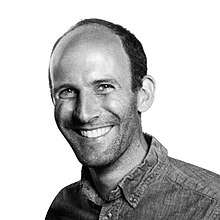Scott Hartley
Scott Hartley (born July 18, 1983) is a venture capitalist and an author.[1] He previously worked for Silicon Valley technology companies such as Google and Facebook as well as Harvard's Berkman Klein Center for Internet and Society.[2] He was a Presidential Innovation Fellow at the White House[2][3] and a partner at Mohr Davidow Ventures, a firm on Sand Hill Road.
Scott Hartley | |
|---|---|
 Scott Hartley | |
| Born | Scott Hartley July 18, 1983 |
| Occupation |
|
| Website | www |
Early life and education
Hartley was born in Richland, Washington, but soon moved to Highlands Ranch, Colorado. His family moved to Palo Alto, California in 1993, where he attended Palo Alto High School.[4] He was a student of Esther Wojcicki.[5] Hartley already completed his second year at the University of Virginia (where he was an Eccles Scholar) when he decided to transfer to Stanford University, seeking classmates with a broader Liberal Arts perspective.[6] In 2005, he finished his BA in Political Science at Stanford and later obtained an MBA at Columbia University Business School and an MIA in International Economic Policy at Columbia University School of International and Public Affairs.[7] He is a term member at the Council on Foreign Relations.
Career
After finishing his BA at Stanford, Hartley started working for Google. He lectured for Google.org and TechnoServe across East Africa.[8] He also spent a year in India setting up the Google India team before moving to Facebook.[9] He left the social media company to become a startup investor.
Hartley has attracted attention for his position that technology is not the only discipline necessary at Silicon Valley. He noted that, although technology is uniform in the technology field, there are many CEOs and startup founders who have backgrounds in humanities, liberal arts, and social sciences.[9] In an interview, he stated that these leaders, based on their performance over time, have the ability to take a step back, ask the right questions, and, empathize with the customer, making them more effective than a leader who merely has technological fluency.[10]
In his book, The Fuzzy and The Techie: Why the Liberal Arts Will Rule the Digital World, Hartley also argued that the business world depends on human touch that soft skills bring despite the increasing role technology plays in running business organizations.[11] His book has been translated into six languages.According to him, technology and the liberals arts cannot be studied in isolation from each other.[12] He spoke about his book at the World Bank annual meeting, USGIF's GEOINT Symposium, Google, IBM, Stanford University with Marissa Mayer, University of Washington, University of Arizona and Arkansas State University.[13][14][15][16] The book was also selected as a book of the month by the Financial Times and was a finalist for the FT and McKinsey & Company's Bracken Bower Prize.[17][18] He maintained that liberal arts degrees are crucial in applying emerging technologies to the creation of breakthrough innovations.[2] Hartley also criticized fellow venture capitalists such as Marc Andreesen,[19] who previously declared that the average graduate with a degree in English ends up "working in a shoe store”.[20] He pushed back against Andreesen's position that a liberal arts education limits the dimensionality of one's thinking since it makes students less familiar with mathematical models and statistics.[19] Hartley said that those with backgrounds in these fields "will develop ethics in artificial intelligence, question bias in algorithms and data and will bring contextual understanding to code.”[21]
Hartley is also a contributing writer to a number of publications, including the Financial Times, Forbes, and Foreign Policy.[21] He is managing partner of a venture capital firm, Two Culture Capital.[22]
Personal life
Hartley lives in Brooklyn, New York.
References
- "Want to survive job automation? Don't think like a robot". Big Think. 2017-11-29. Retrieved 2019-04-09.
- "The fuzzy and the techie by Scott Hartley reviewed – Irish Tech News". Retrieved 2019-04-09.
- "Review: Liberal Arts will rule the digital world". www.nbc-2.com. Retrieved 2019-05-25.
- "In Deep with Angie Coiro Presents: Scott Hartley". Kepler's Literary Foundation. Retrieved 2019-04-11.
- Slee, Tom (2017-06-14). "Silicon Valley to Liberal Arts Majors: We Want You". Boston Review. Retrieved 2019-05-25.
- Fried, Joshua (March–April 2005). "New Kids on the Quad". Stanford Magazine. Retrieved 2019-04-11.
- "Scott Hartley". www.goodreads.com. Retrieved 2019-04-09.
- "Scott Hartley". Carnegie Council for Ethics in International Affairs. Retrieved 2019-04-11.
- Gupta, Aparajita (September 19, 2018). "'Technology And The Liberals Arts Are Married To Each Other'". Outlook India. Retrieved 2019-04-11.
- Brown, Jeffrey (2018-12-07). "How these humanities graduates are finding jobs in Silicon Valley". PBS NewsHour. Retrieved 2019-04-18.
- Blaschka, Amy. "The Number One Soft Skill Employers Seek--And Five Ways Top Leaders Say To Cultivate Yours". Forbes. Retrieved 2019-04-09.
- "'Technology And The Liberals Arts Are Married To Each Other'". Outlook India. Retrieved 2019-05-25.
- ""Fuzzy" and "Techie": A False Divide? | Stanford Undergrad". undergrad.stanford.edu. Retrieved 2019-05-25.
- "The GEOINT Symposium - USGIF". usgif.org. Retrieved 2019-05-25.
- "Review: The Fuzzy and the Techie by Scott Hartley". Hindustan Times. 2019-01-18. Retrieved 2019-05-25.
- "Are you a Fuzzy or a Techie?". Trajectory Magazine. 2018-04-11. Retrieved 2019-05-25.
- "Financial Times business books of the month: April edition". Financial Times. Retrieved 2019-05-25.
- "FT announces Bracken Bower prize finalists". Financial Times. Retrieved 2019-05-25.
- Kauchler, Hannah (November 1, 2017). "How Silicon Valley learnt to love the liberal arts". Financial Times. Retrieved 2019-04-16.
- Shontell, Alyson. "ANDREESSEN: If You Get An English Degree In College, You're Going To End Up Working At A Shoe Store". Business Insider. Retrieved 2019-04-16.
- Afshar, Vala (2017-08-02). "The Importance of Liberal Arts In The AI Economy". HuffPost. Retrieved 2019-04-16.
- "Scott Hartley - Investor @ Impraise". Crunchbase. Retrieved 2019-05-25.